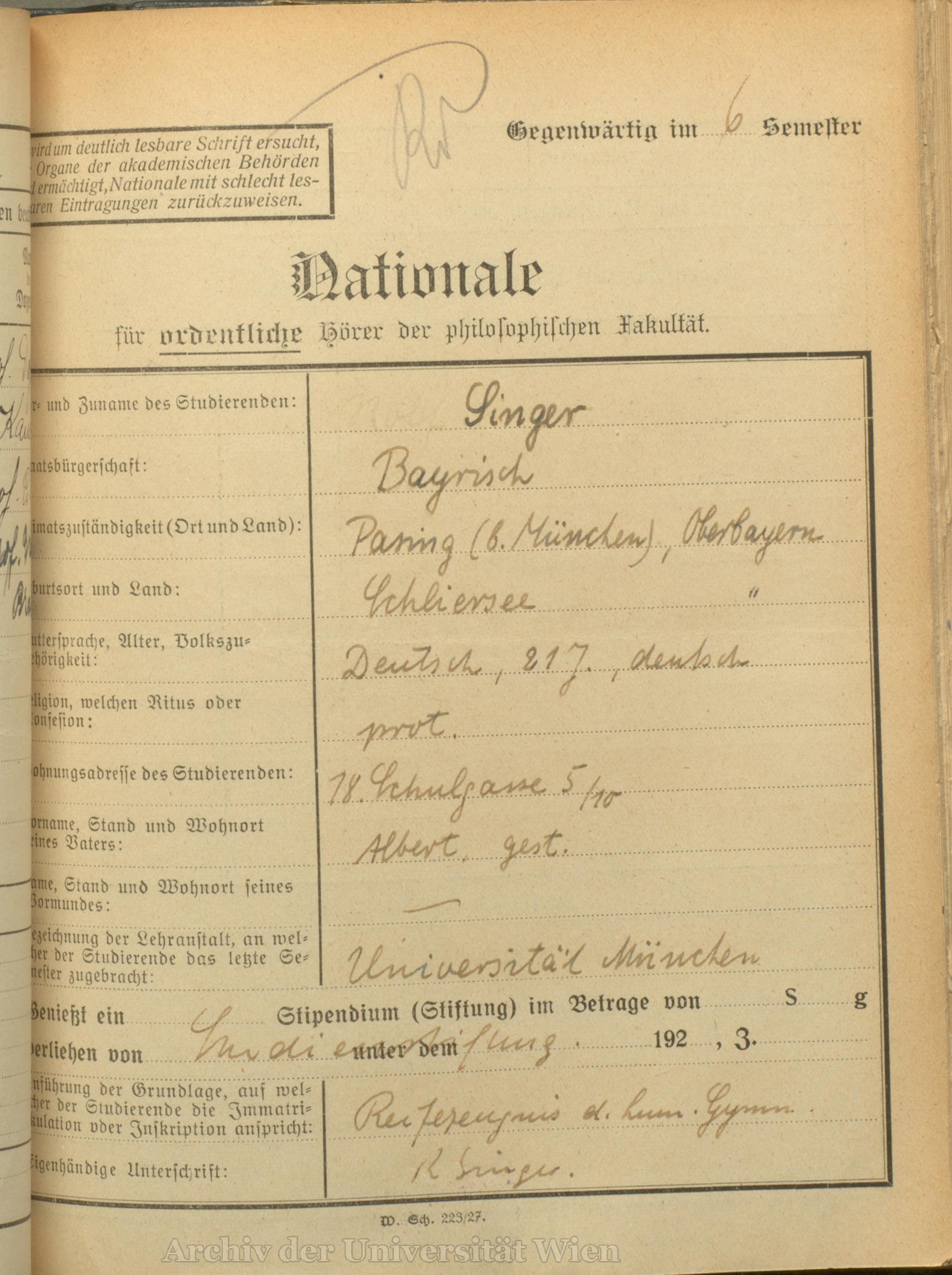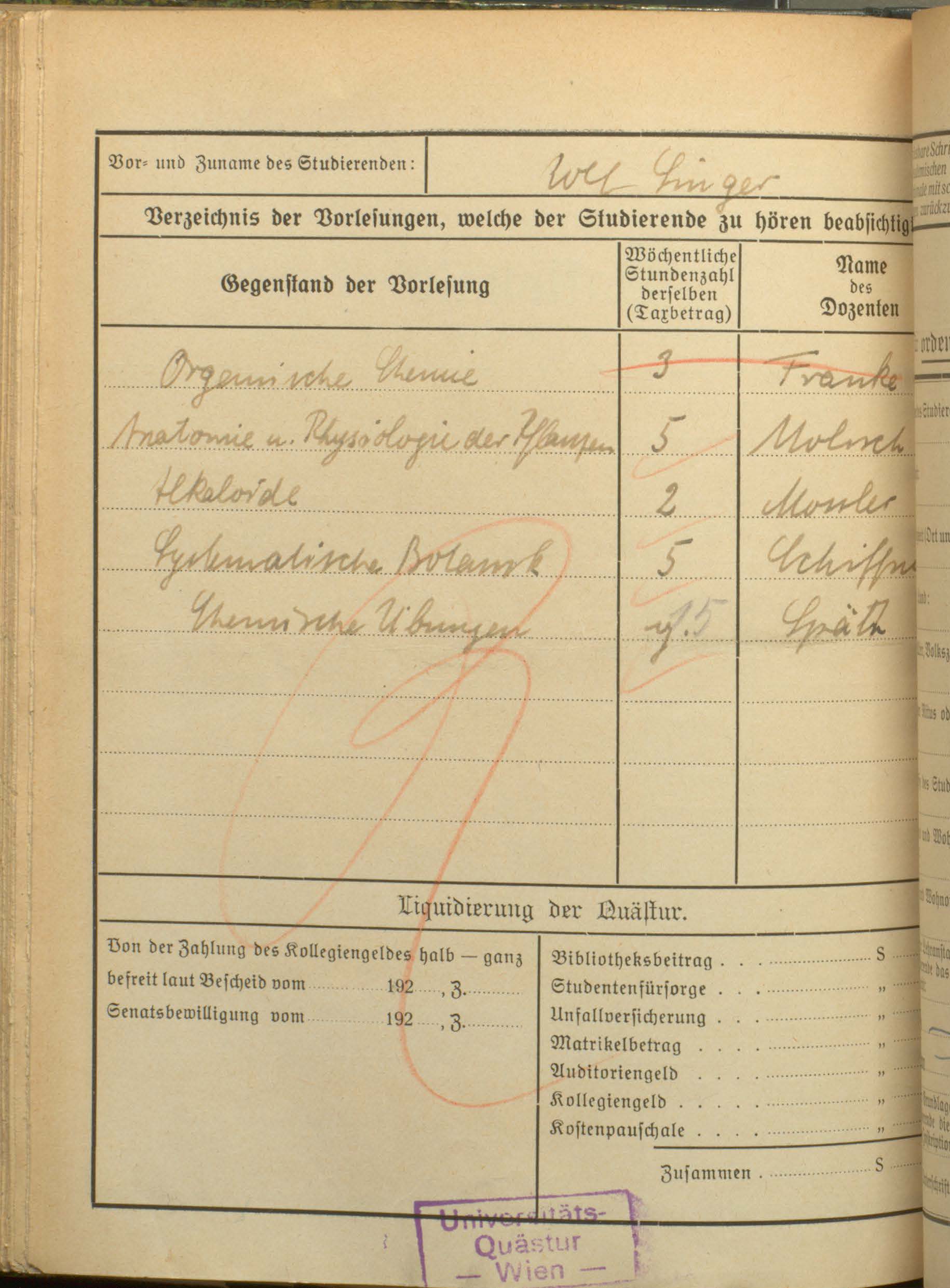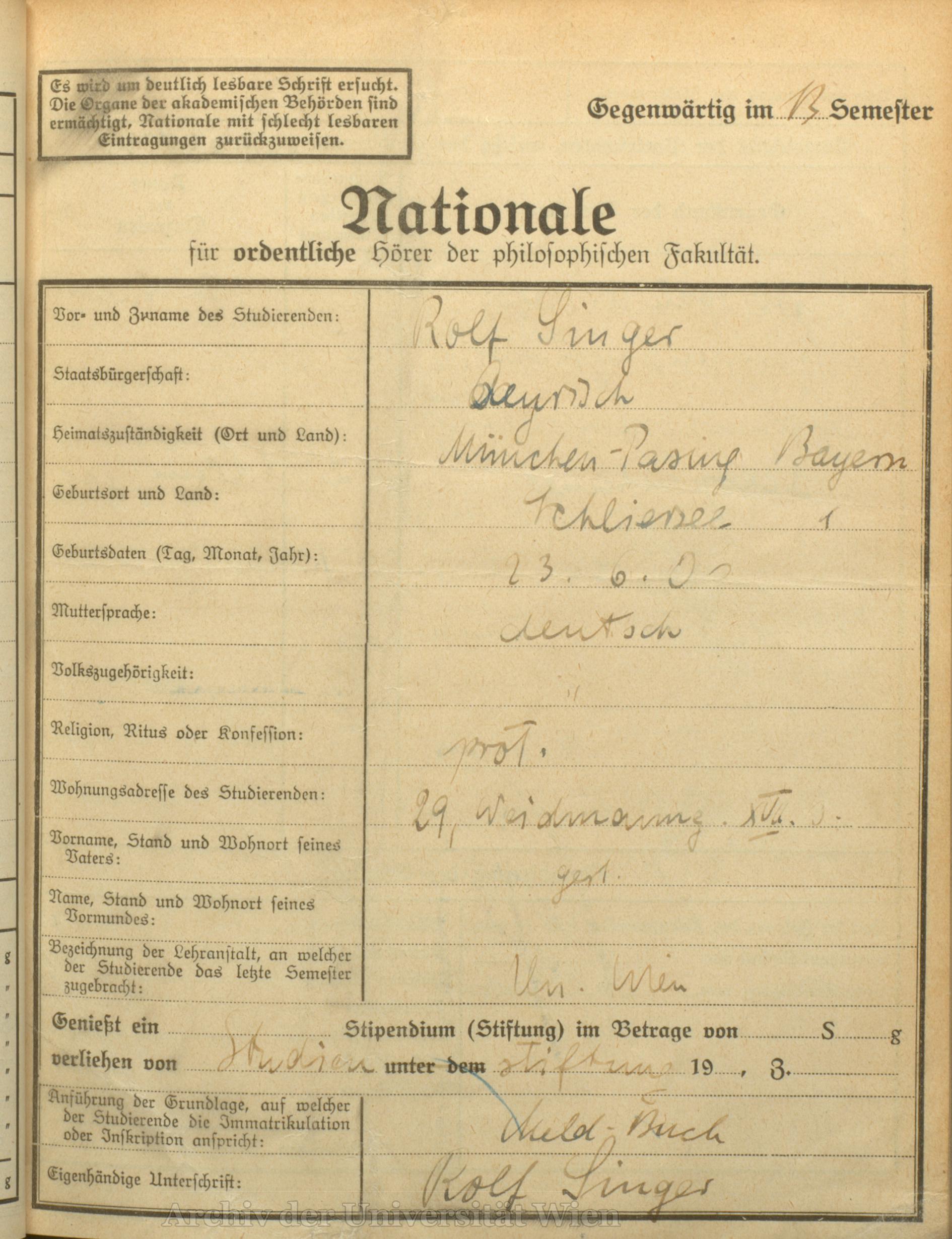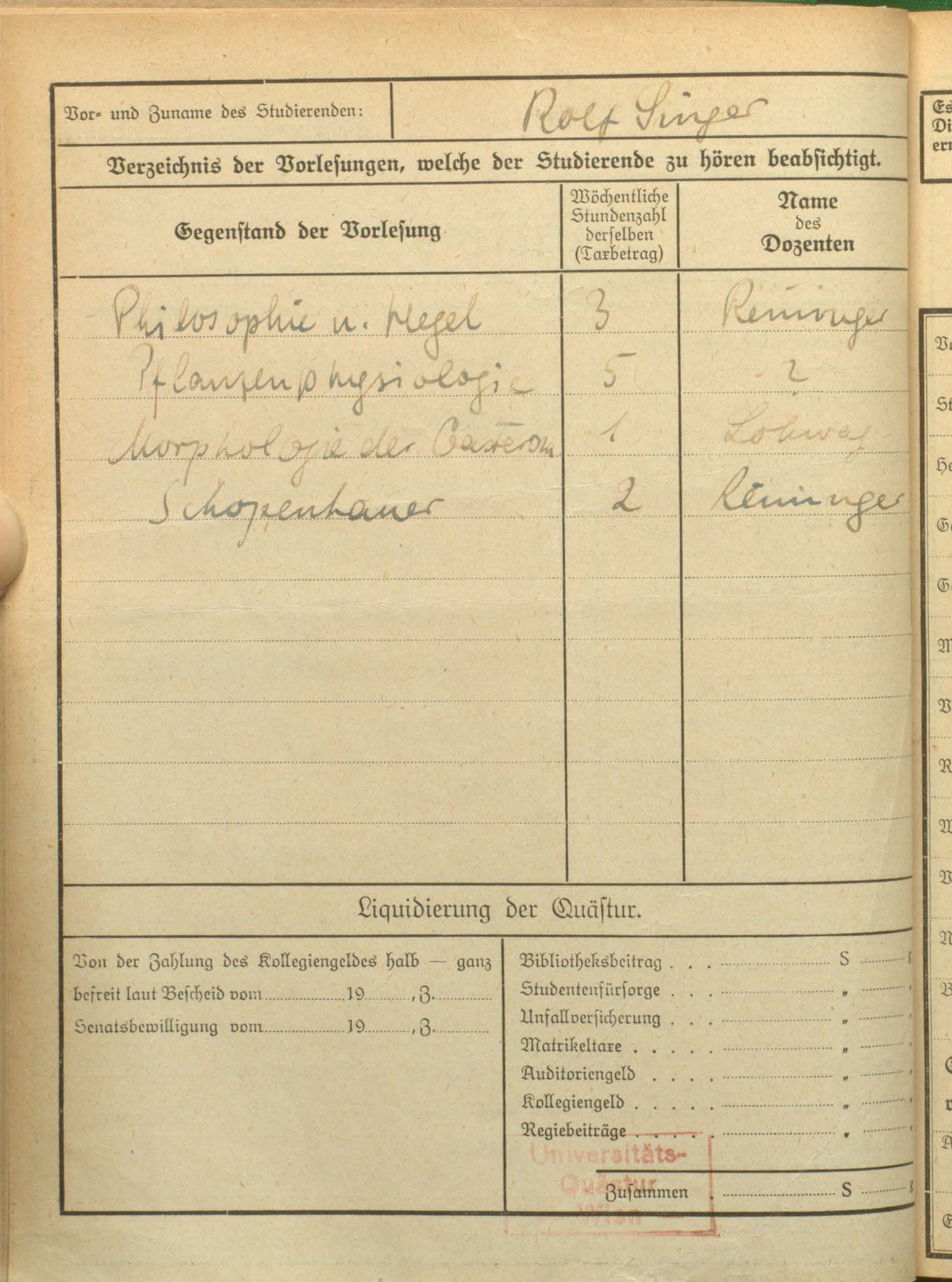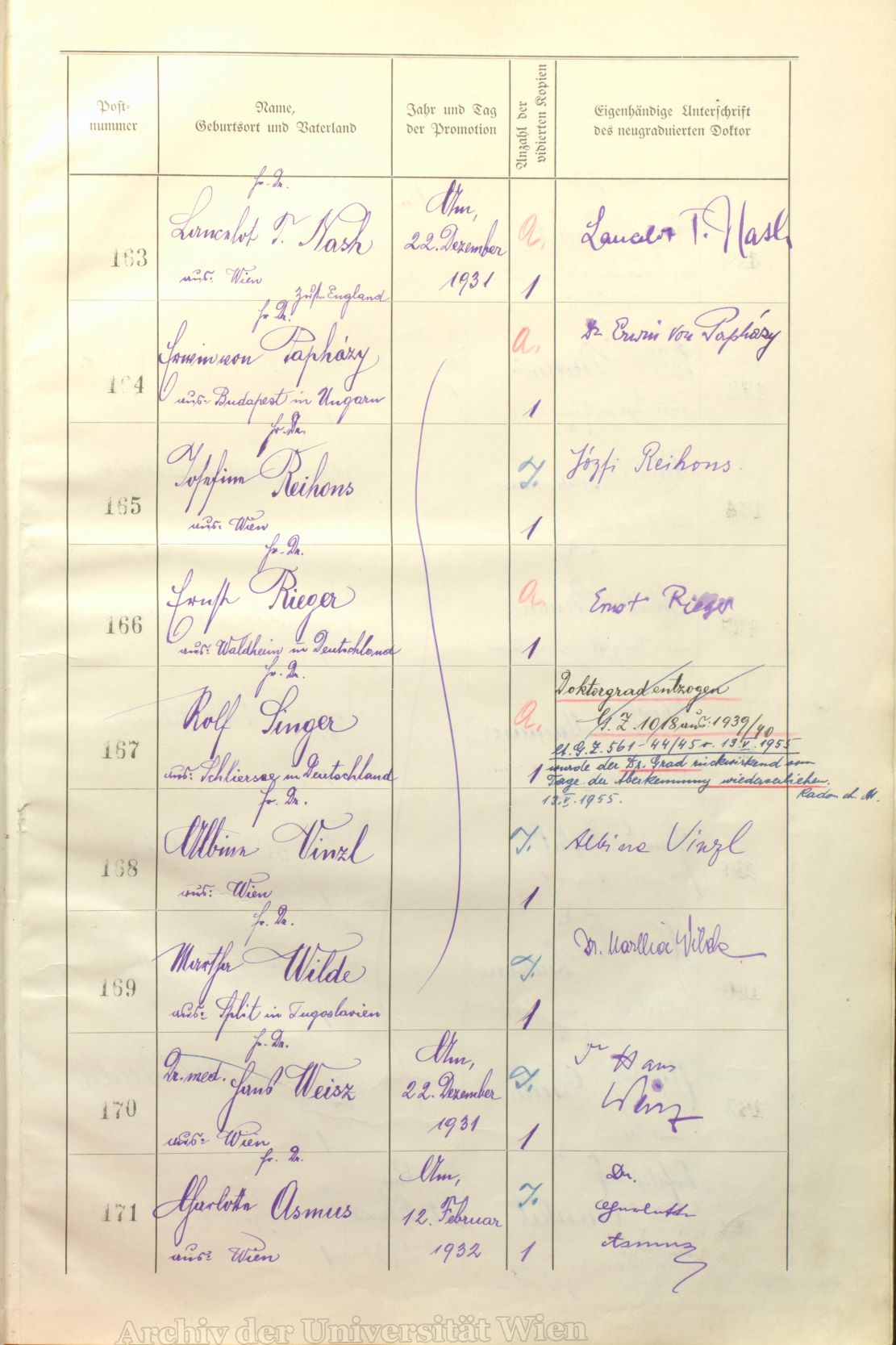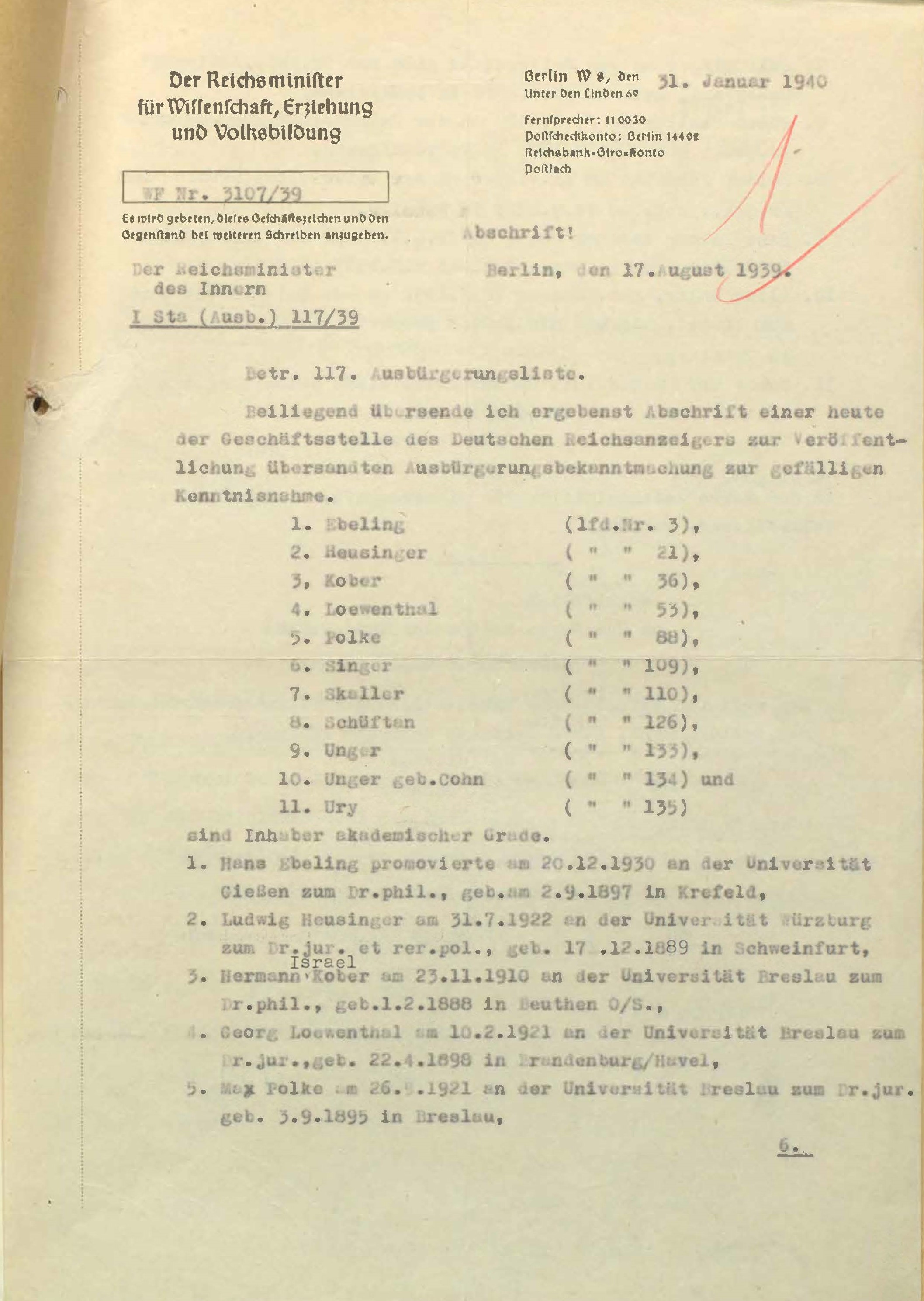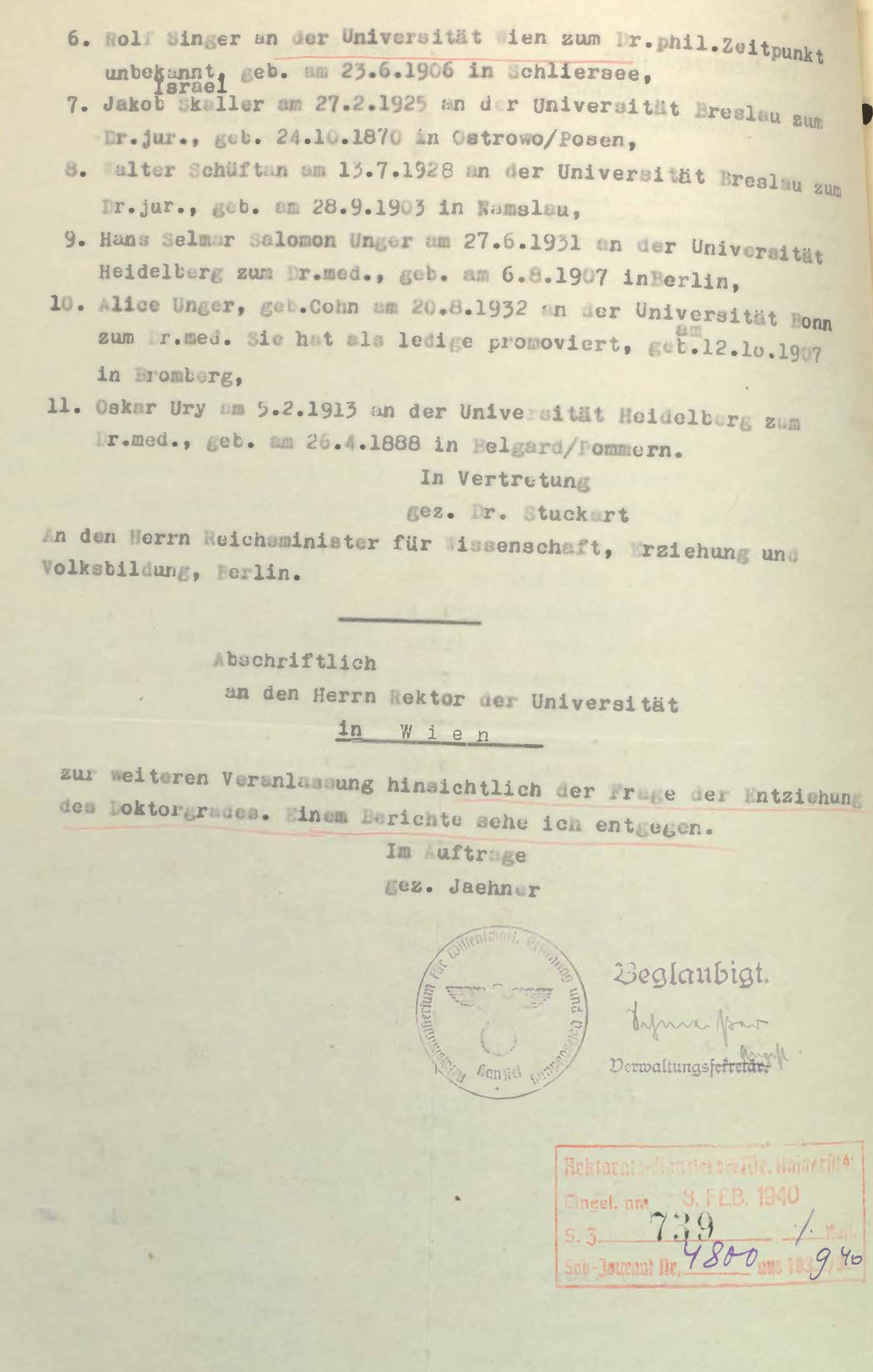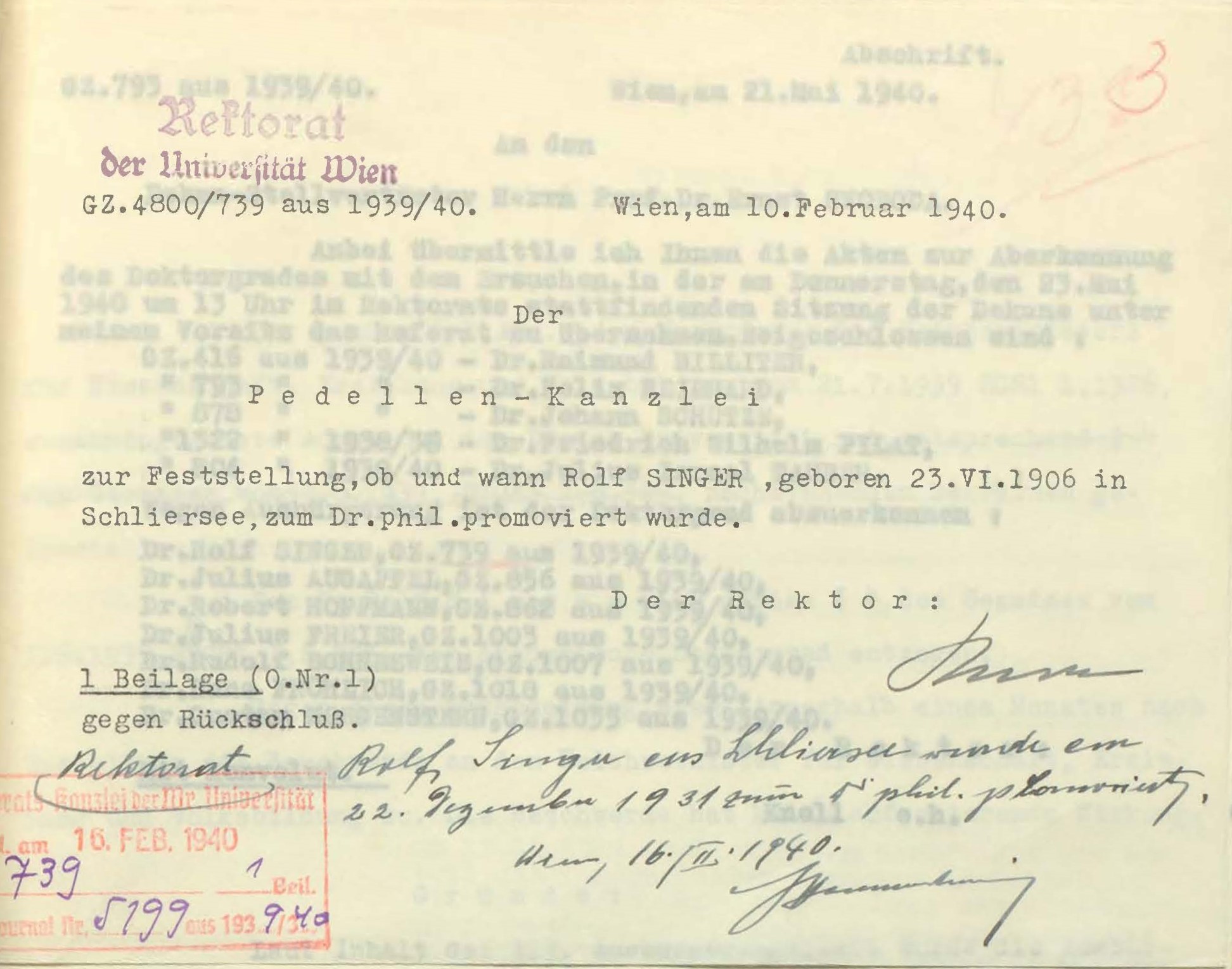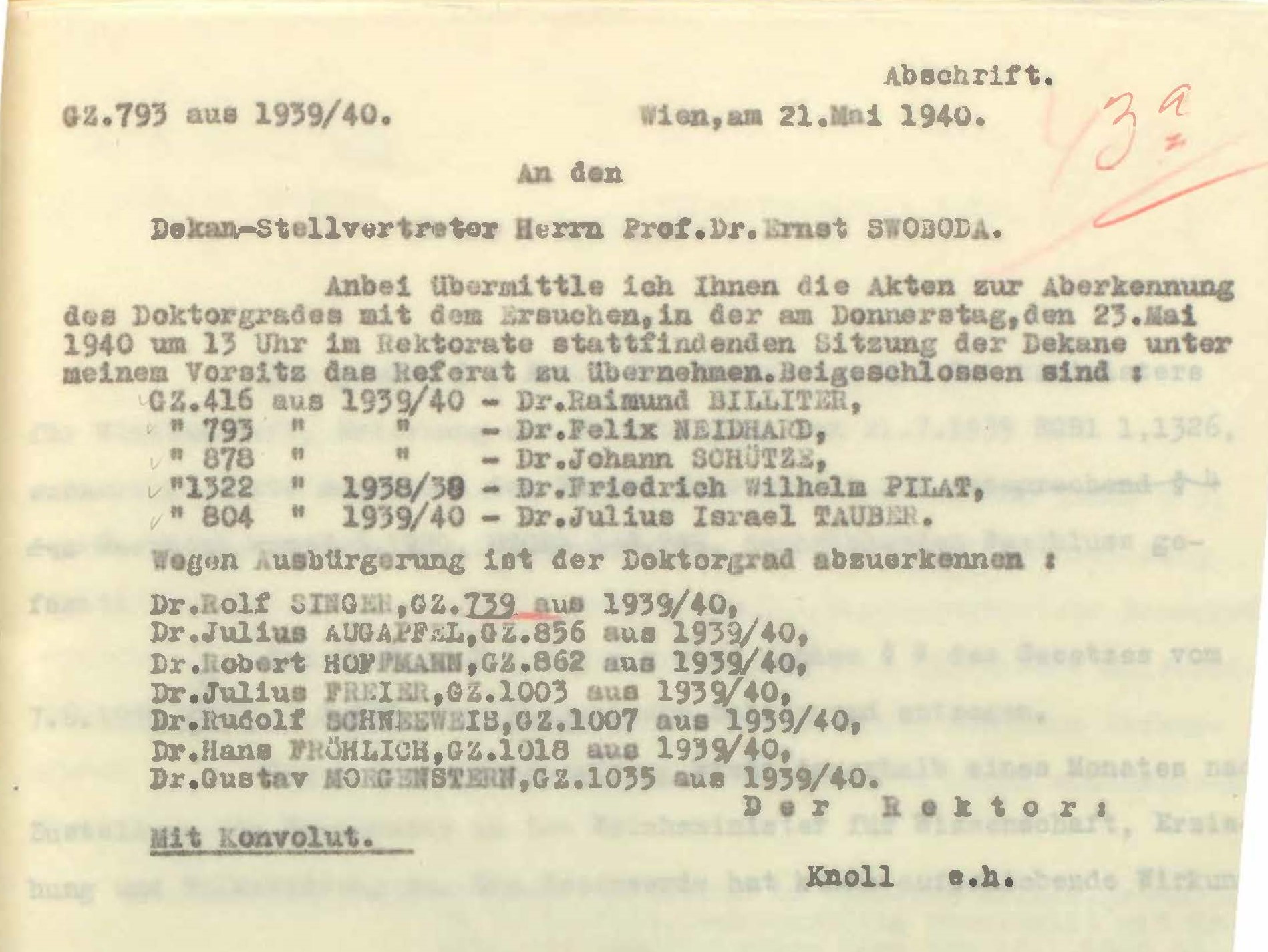| Born: | 06-23-1906 |
| Faculty: | Philosophical School |
| Category: | Deprivation of academic degree |
Rolf SINGER, born on June 23rd, 1906, in Schliersee, Bavaria/German Reich, the son of the animal and genre painter Albert Singer (1869-1922) and Eva Singer, née Hennicke (1874-1960), attended grammar school in "Progymnasium" in Pasing, in "Humanistisches Gymnasium" in Amberg and in the last year in "Ludwigsgymnasium" in Munich where he passed his school-leaving examination (Matura) on April 2nd, 1925. He then studied chemistry at the University of Munich from the spring term of 1925. He then moved to the University of Vienna for four years in the fall term 1927/28 to study botany at the Philosophical School there with Prof. Hans Molisch (1856-1937) and private lecturer Heinrich Lohwag (1884-1945) (he was called "the last pupil of Prof. Rochard Wettstein (1863-1931), although he did not take any lectures with him). He was also able to take part in the first Austrian and the first International Caucasus expeditions organized by the Austrian Academy of Sciences in Vienna in the summer of 1928 and in 1929 (with Dr. Otto Watzl and Prof. Karl Swoboda), was involved in the first ascent of the Giulchi (4,475 m) and published the results of his primarily fungal studies in two major publications. He also published numerous popular articles on his main focus of mycology, mushrooms and mushroom poisoning, in specialist journals as well as in the Rote Fahne, the central organ of the Communist Party in Austria.
After approval of his dissertation "Monografie der Gattung Russula" (printed in: Beihefte zum Botanischen Centralblatt vol. 49, Abt. II, 1932) on July 8th, 1931, he also passed the two-hour viva voce with Richard Wettstein (represented by Viktor Schiffner), Faber and Ernst Späth and a few months later, on December 12th, 1931, also the "Philosophicum"-viva voce (examiners: Robert Reininger, Karl Bühler).
On December 22nd, 1931, he was awarded a doctorate in botany from the Philosophical School at the University of Vienna.
Rolf Singer returned to Munich in early 1932 but fled Germany after the National Socialists seized power. He returned to Vienna, where he met the Viennese-born Martha ("Mimi") Kupfer (1910-2003, sculptor) again, his later wife. But after the Dollfuss coup in 1933 and the civil war in February 1934, they fled to Spain, where he was given an assistant professorship at the Autonomous University of Barcelona. In the course of the Spanish Civil War, however, he was dismissed under pressure from the German Reich and they had to move to Paris/France in 1934, where he worked for two years on a scholarship at the Natural History Museum and moved to the USSR, where ge arrived on October 1st, 1935 for more than five years. From October 20th, 1935 he worked in the Botanical Institute of the Academy of Sciences of the USSR in Leningrad [St. Petersburg/Russia] and lived in a house located in the Botanical Garden. Shortly after the arrival of his wife in early January 1936, daughter Heidi (Eustaquio) was born in Leningrad in January 19th, 1936, and Martha and Rolf Singer married a week later and stayed in Leningrad until the beginning of 1941.
During this time, he was expatriated by the Third Reich in 1939 as he was "not worthy of German citizenship" - presumably for political reason. The revocation of his citizenship became legally binding with the announcement in the German Reich Gazette No. 192 of August 21st, 1939, which meant that all his domestic assets were confiscated for the benefit of the German Reich and he also lost all civil rights. As one of the legal consequences, the Berlin Reich Ministry of the Interior requested the Berlin Reich Ministry of Education to revoke the doctorate he had obtained there in 1931 at the University of Vienna, which had belonged to the Third Reich since the Anschluss in 1938. As a result, his degree was revoked on June 20th, 1940, as he was not considered dignified an academic degree of a German university ("eines akademischen Grades einer deutschen Hochschule unwürdig") under National Socialism.
Singer was still in Leningrad at this time, but after the German attack on the Soviet Union in 1941, he moved via Kobe/Japan to the USA and landed in San Francisco on February 27th, 1941, to work in the Farlow Herbarium of Cryptogamic Botany, Harvard University. After the end of the Second World War he also became an American citizen in January 1946 and moved on to Argentina in 1948, where he worked as a professor at the Universidad Nacional de Tucumán until 1961.
During this time, the University of Vienna - 15 years after the revocation and long after the end of National Socialism - restored his doctorate on May 15th, 1955, and declared the revocation "void from the beginning" without informing him.
Singer moved to Argentina in 1961 as a professor at the Universidad de Buenos Aires before returning to the USA in 1968, where he worked at the Field Museum of Natural History at the University of Illinois in Chicago until his retirement in 1977 (interrupted by research stays in Lausanne in 1970/71 and Manaus in 1976/78).
Rolf Singer was a leading international expert on the taxonomy and phylogeny of fungi and also dealt with ecological aspects of fungi. He wrote over 400 scientific articles and seven books, described around 80 genera of fungi and around 2,500 species and subspecies from 22 genera. His works include The Boletineae of Florida (1945), The Agaricales in Modern Taxonomy Lilloa (1949, 1986 4th ed. Koeltz Scientific Books, Koenigstein), Mushrooms and Truffles. Botany, Cultivation and Utilization (Koeltz Scientific Books 1961), with. Alexander Hanchett Smith: Monograph of the Genus Galerina (1964) and Die Pilze Mitteleuropas (1965).
He also remained in contact with Vienna, the local specialist community and the university and held several lectures, practical courses and excursions at the University of Vienna in spring 1976, summer 1979 and fall 1985. As part of his several-month guest professorship at at the Vienna University Botanical Institute in August 1979 he wsa alo founding the local new mycological herbarium, which is still maintained on a voluntary basis by the Austrian Mycological Society.
Prof. Dr. Rolf Singer died at the age of 87 on January 18th, 1994, in Chicago, IL, and is buried at New Light Cemetery in Lincolnwood, IL/USA.
Lit.: Archive of the University of Vienna/enrollment forms ("Nationale") PHIL 1928-1931, final examination registry and file ("Rigorosenprotokoll und -akt") PH RA 11121, graduation registry ("Promotionsprotokoll") PHIL 1931-1941 No. 167, Rectorate GZ 739 ex 1939/40, GZ 1018 ex 1939/40, GZ 561/15 ex 1944/45; Documentation Centre of Austrian Resistance DÖW 6318: Deutscher Reichsanzeiger No. 192 of August 21st, 1939; Martha SINGER, Glancing back, in: Festschrift für Rolf SINGER, Sydowia, Beiheft VIII, 1979; ROEDER 1983, 1088f.; Martha SINGER, Mycologists and other taxa, Braunschweig 1984; Heinz CELÈMENCON, Rolf Singer, in: Z. MYKOL. 60(1), 1994, 328-331; POSCH 2009, 478; wikipedia; www.genteam.at; www.ancestry.de; https://myk.univie.ac.at/die-geschichte; information by courtesy of Dr. Valentin Golub, Tolyatti/RU 06/2025 and Dr. Hermann Voglmayr, Vienna 06/2025.
Herbert Posch
